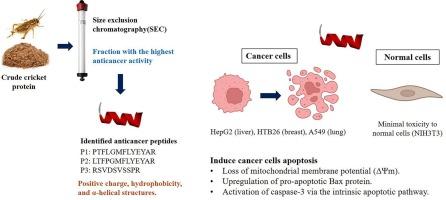探索蟋蟀肽在人类癌细胞中的抗癌潜力;通过 Caspase-3 途径产生促凋亡效应
IF 4
2区 农林科学
Q2 FOOD SCIENCE & TECHNOLOGY
引用次数: 0
摘要
蟋蟀衍生的多肽已成为开发新型抗癌药物的有希望的候选者。这是由于它们独特的生物活性和潜在的治疗效益。目前的研究探索了从家蟋蟀(Acheta domesticus)蛋白中提取的肽的抗癌潜力,特别评估了其对一系列人类癌细胞系的影响。三个不同的肽被鉴定和表征,P1 (PTFLGMFLYEYAR), P2 (LTFPGMFLYEYAR)和P3 (RSVDSVSSPR)。这些多肽的细胞毒性通过一系列的体外实验进行了评估,证明了它们在各种癌症细胞类型中具有显著的促凋亡作用,包括人肝癌细胞系(HepG2)、人乳腺癌细胞系(HTB26)和人肺癌细胞系:A549。通过内在途径证实肽P1-P3诱导凋亡。这可以通过促凋亡因子的上调和procaspase-3的蛋白水解裂解来证明,从而导致caspase-3的激活,而caspase-3是细胞凋亡的关键执行者。肽序列的鉴定揭示了关键氨基酸残基似乎在增强膜相互作用和维持构象灵活性方面发挥作用。此外,该研究还研究了与正常细胞相比,这些肽对癌细胞的选择性,表明它们具有有益的治疗潜力。本研究提示蟋蟀衍生肽作为有效抗癌剂的潜力。增强这些特性对于将这些肽从临床前研究推进到临床应用至关重要。本文章由计算机程序翻译,如有差异,请以英文原文为准。

Exploring the anticancer potential of cricket-derived peptides in human cancer cells; pro-apoptotic effects via a caspase-3 pathway
Cricket-derived peptides have emerged as promising candidates in the development of novel anticancer agents. This is due to their unique biological activities and potential therapeutic benefits. The current study explores the anticancer potential of peptides derived from house cricket (Acheta domesticus) protein, specifically evaluating its effects on a range of human cancer cell lines. Three distinct peptides were identified and characterized, P1 (PTFLGMFLYEYAR), P2 (LTFPGMFLYEYAR), and P3 (RSVDSVSSPR). The cytotoxicity of these peptides was assessed through a series of in vitro assays that demonstrated their significant pro-apoptotic effects across various cancer cell types, including a human liver cancer cell line (HepG2), a human breast cancer cell line (HTB26), and a human lung cancer cell line: A549. Apoptotic induction by peptides P1-P3 was confirmed via the intrinsic pathway. This was evidenced by the upregulation of pro-apoptotic factors and the proteolytic cleavage of procaspase-3, leading to the activation of caspase-3, a key executor of apoptosis. Identification of peptide sequences revealed crucial amino acid residues that appear to play a role in enhancing membrane interaction and maintaining conformational flexibility. Additionally, the study investigated the selectivity of these peptides toward cancer cells compared to normal cells, indicating their beneficial therapeutic potential. This study suggests the potential of cricket-derived peptides as effective anticancer agents. Enhancing these properties will be crucial for advancing these peptides from preclinical studies to clinical applications.
求助全文
通过发布文献求助,成功后即可免费获取论文全文。
去求助
来源期刊

Journal of Functional Foods
FOOD SCIENCE & TECHNOLOGY-
CiteScore
9.60
自引率
1.80%
发文量
428
审稿时长
76 days
期刊介绍:
Journal of Functional Foods continues with the same aims and scope, editorial team, submission system and rigorous peer review. We give authors the possibility to publish their top-quality papers in a well-established leading journal in the food and nutrition fields. The Journal will keep its rigorous criteria to screen high impact research addressing relevant scientific topics and performed by sound methodologies.
The Journal of Functional Foods aims to bring together the results of fundamental and applied research into healthy foods and biologically active food ingredients.
The Journal is centered in the specific area at the boundaries among food technology, nutrition and health welcoming papers having a good interdisciplinary approach. The Journal will cover the fields of plant bioactives; dietary fibre, probiotics; functional lipids; bioactive peptides; vitamins, minerals and botanicals and other dietary supplements. Nutritional and technological aspects related to the development of functional foods and beverages are of core interest to the journal. Experimental works dealing with food digestion, bioavailability of food bioactives and on the mechanisms by which foods and their components are able to modulate physiological parameters connected with disease prevention are of particular interest as well as those dealing with personalized nutrition and nutritional needs in pathological subjects.
 求助内容:
求助内容: 应助结果提醒方式:
应助结果提醒方式:


